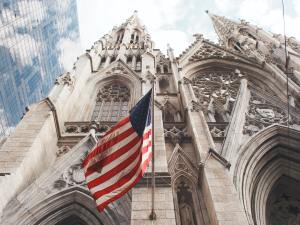Of Unity and the Tenth Commandment
February 27, 2021 Leave a comment
Photo by Luis Lara on Unsplash
It may be a commonplace to comment on popular culture’s war on the Ten Commandments, but it merits the effort. At best they are treated in Hollywood and other secular Zions of pop culture as the Ten Old Fashioned Ideas. Undeniably, Moses was after all just another one of those old white men, whom many with public microphones wish would fade from the contemporary scene (as long as they keep paying the bills).
Yet there seems to linger in the hearts and minds of most people in America who are not cultural trend setters an enduring if vague respect for Ten Commandment concepts such as the preeminence of God, the duties to parents, abhorrence of murder, the value of marriage covenants, the evils of theft, and that telling the truth is still better than lying. These are basic concepts that even children have little trouble understanding.
I must confess, however, that as a child I had difficulty understanding the tenth commandment, “Thou shalt not covet” (Exodus 20:17). “Covet” is not a word much found in a child’s vocabulary, or in anyone else’s for that matter. It required explaining to me. Then it was not overly hard to take in as an idea. I did wonder, though, why it had an exalted place with the other nine commandments. The gravity of theft, murder, sacrilege, lying, not going to Church on Sunday, and even dishonoring parents I could sense as a child, but why make such a big deal about coveting? Very bad things happen from breaking those other commandments. Sure, coveting, as explained to me, led to other sins, such as stealing, murder, lying and the rest, but where was the great evil in the thing itself? You could go to jail for breaking some of the other Ten Commandments, and you certainly were on the high road to hell if you did. Coveting might make you feel unhappy or dislike someone who had something you wanted—not good, but was it really so bad?
I have come to learn, with time and experience, that the answer is, Yes, it is very bad. The Ten Commandments address, first, our relationship with God; second, our relationship with family; and finally our relationship with our neighbors and in the communities where we live. Coveting is a powerful corrosive acid in community relationships. It dissolves kindness and respect and love for our fellows, leaving an envy that has hate at its root.
Indulged in, coveting insidiously works to separate us from those who have what we might want. One need not act on the coveting, one need not steal, lie, cheat, commit adultery, or engage in other offenses for the wedge of coveting to work its evil within society. Neighbors become cold, businessmen and workers become self-centered, helping hands become harder to find, envy and jealousy increasingly push compassion and cooperation aside. The poor hate any richer than they, and those who are better off lose their pity and concern for those whom they might otherwise be quick to help and encourage.
I am not one who looks to our political leaders to be moral leaders, but I do look to them to be virtuous. Morality must be a fundamental qualification for those to whom we give authority to make, execute, and judge the laws if we want our laws and their administration to be based upon virtue. We do not and should not derive our morality from these people, but we should expect them to act morally in the exercise of the duties and powers that they derive from the people whom they govern.
It is more than irresponsible, then, that coveting is in fact advocated for the nation to embrace as a defining element of economic policy. This national call to covet is dangerous to our community. Look again at how the evil was described on Mount Sinai:
Thou shalt not covet thy neighbour’s house, thou shalt not covet thy neighbour’s wife, nor his manservant, nor his maidservant, nor his ox, nor his ass, nor any thing that is thy neighbour’s. (Exodus 20:17)
All sharing in the tax burden is a necessary element of self-government. Self-government does not work without all the individual selves in society pitching in fairly. What Congress enacts as national policy should be carried by those who compose the nation.
By the way, I am not aware of any religion that condones coveting. But even if the fear of God does not make you slow to covet, objective love for the nation as a whole and the integrity of the society should cause you to recoil from a political platform based upon feeding the fires of envy.


